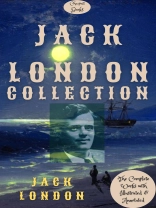This Excellent Collection brings together Jack London’s longer, major books and a fine selection of shorter pieces and Fiction Books. These Books created and collected in Jack London’s Most important Works illuminate the life and work of one of the most individual writers of the XX century – a man who elevated political writing to an art.
John Griffith London (born John Griffith Chaney; January 12, 1876 – November 22, 1916) was an American novelist, journalist, and social activist. A pioneer of commercial fiction and American magazines, he was one of the first American authors to become an international celebrity and earn a large fortune from writing. He was also an innovator in the genre that would later become known as science fiction.
His most famous works include ‘The Call of the Wild’ and ‘White Fang’, both set in the Klondike Gold Rush, as well as the short stories ‘To Build a Fire’, ‘An Odyssey of the North’, and ‘Love of Life’. He also wrote about the South Pacific in stories such as ‘The Pearls of Parlay’, and ‘The Heathen’.
London was part of the radical literary group ‘The Crowd’ in San Francisco and a passionate advocate of unionization, workers’ rights, socialism, and eugenics. He wrote several works dealing with these topics, such as his dystopian novel The Iron Heel, his non-fiction exposé ‘The People of the Abyss’, ‘War of the Classes’, and ‘Before Adam’.
This Collection included:
1. A Daughter of the Snows
2. The Call of the Wild
3. The Sea-Wolf
4. The Game
5. White Fang
6. The Iron Heel
7. Martin Eden
8. Burning Daylight
9. Adventure
10. The Scarlet Plague
11. A Son of the Sun
12. The Valley of the Moon
13. The Mutiny of the Elsinore
14. The Jacket (The Star-Rover)
15. The Little Lady of the Big House
16. Jerry of the Islands
17. Michael, Brother of Jerry
18. Before Adam
19. The Son of the Wolf
20. Children of the Frost
21. Tales of the Fish Patrol
22. Lost Face
23. South Sea Tales
24. The House of Pride and Other Tales of Hawaii
25. Smoke Bellew
26. The Turtles of Tasman
27. On the Makaloa Mat
28. The Road
29. John Barleycorn
30. When God Laughs and Other Stories
31. Dutch Courage and Other Stories
32. The Human Drift and Other Stories
33. The God of His Fathers: Tales of the Klondyke
34. Love of Life and Other Stories
35. The Red One
36. The Night-Born
37. War of the Classes
38. The Faith of Men
39. The Strength of the Strong
40. Moon-Face and Other Stories
41. A Thousand Deaths
42. Up The Slide
43. The Sundog Trail
44. The Acorn-Planter
45. Theft
46. The People of the Abyss
47. Revolution and Other Essays
48. The Cruise of the Snark
Mengenai Pengarang
After working in the Klondike, Jack London returned home and began publishing stories. His novels, including The Call of the Wild, White Fang and Martin Eden, placed London among the most popular American authors of his time. London, who was also a journalist and an outspoken socialist, died in 1916.Early Years John Griffith Chaney, better known as Jack London, was born on January 12, 1876, in San Francisco, California. Jack, as he came to call himself as a boy, was the son of Flora Wellman, an unwed mother, and William Chaney, an attorney, journalist and pioneering leader in the new field of American astrology. His father was never part of his life, and his mother ended up marrying John London, a Civil War veteran, who moved his new family around the Bay Area before settling in Oakland. London grew up working-class. He carved out his own hardscrabble life as a teen. He rode trains, pirated oysters, shoveled coal, worked on a sealing ship on the Pacific and found employment in a cannery. In his free time he hunkered down at libraries, soaking up novels and travel books.The Young Writer His life as a writer essentially began in 1893. That year he had weathered a harrowing sealing voyage, one in which a typhoon had nearly taken out London and his crew. The 17-year-old adventurer had made it home and regaled his mother with his tales of what had happened to him. When she saw an announcement in one of the local papers for a writing contest, she pushed her son to write down and submit his story. Armed with just an eighth-grade education, London captured the $25 first prize, beating out college students from Berkeley and Stanford. For London, the contest was an eye-opening experience, and he decided to dedicate his life to writing short stories. But he had trouble finding willing publishers. After trying to make a go of it on the East Coast, he returned to California and briefly enrolled at the University of California at Berkeley, before heading north to Canada to seek at least a small fortune in the gold rush happening in the Yukon. By the age of 22, however, London still hadn’t put together much of a living. He had once again returned to California and was still determined to carve out a living as a writer. His experience in the Yukon had convinced him he had stories he could tell. In addition, his own poverty and that of the struggling men and women he encountered pushed him to embrace socialism. In 1899 he began publishing stories in the Overland Monthly. The experience of writing and getting published greatly disciplined London as a writer. From that time forward, London made it a practice to write at least a thousand words a day.












